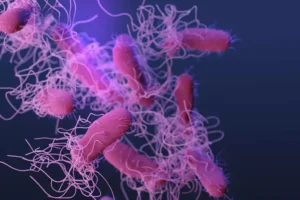Salamanders might look harmless with their soft skin and slow crawl, but they can carry germs that spread to humans.
Yes, salamanders can make you sick if you touch them and then touch your mouth, eyes, or food without washing your hands. The main risk comes from bacteria, especially salmonella. It doesn’t make the salamander sick, but it can cause serious stomach problems in people.
So if you handle a salamander, clean up right after, even if it looks clean and healthy.
Where the Risk Comes From
Salamanders naturally carry bacteria and other microorganisms on their skin. You won’t see it, and they won’t show signs of being sick, but the germs are still there.
The biggest concern is salmonella, a bacteria that lives in the digestive tract of many amphibians and reptiles.

It comes out in their poop, and even if you don’t touch poop directly, it can be on their skin, in their water, or on anything in their enclosure.
If you touch a salamander or clean its tank, then eat without washing your hands, you could end up swallowing those bacteria.
For most healthy adults, it’s just a bad stomach ache and maybe a fever.
But for kids, older people, or anyone with a weak immune system, it can be much more dangerous.
How Infection Happens
You don’t have to eat or lick a salamander to get sick.
Just touching one, or touching something they’ve been in (like tank water, decorations, or bedding) can put germs on your hands.
From there, it’s just a matter of touching your mouth, your face, or your food.
People also run into trouble when they let salamanders walk across countertops, or when kids play with them and forget to wash up afterward.
Even pet salamanders kept in clean tanks can carry salmonella. It’s just part of how their bodies work.
What the Symptoms Look Like
If you do get sick from salmonella, symptoms usually start 6 to 72 hours after exposure. They can include:
- Diarrhea
- Fever
- Stomach cramps
- Nausea
- Vomiting
Most people recover on their own within a few days, but severe cases can lead to dehydration or even hospitalization.
Babies, toddlers, older adults, and people with certain health conditions are more likely to have serious complications.
Are Some Species Safer Than Others?
Not really. Whether it’s a small fire belly newt or a large tiger salamander, the risk is still there.
Some wild-caught salamanders may carry more bacteria just from being out in nature, but even captive-bred salamanders raised in clean environments can still carry salmonella and other germs.

So the real difference comes from how you handle them, not the species itself.
Safe Handling Tips
Salamanders aren’t dangerous to keep as pets if you take simple precautions. Most people who get sick didn’t wash their hands or let kids handle them too freely.
Here’s how to stay safe:
- Always wash your hands thoroughly after touching a salamander or anything in its enclosure.
- Never eat, drink, or prepare food while handling them.
- Keep salamanders out of the kitchen, bathroom sinks, and any food areas.
- Don’t kiss or cuddle them.
- Don’t let young kids handle them unsupervised.
- Clean tanks and supplies in a designated area, not in sinks used for food or dishwashing.
- Wear gloves if you have cuts on your hands or if you’re cleaning tanks.
These simple steps reduce your risk of getting sick without taking away from the joy of having one of these quiet little animals around.
What About Wild Salamanders?
If you find a salamander outside, it’s best not to touch it at all.
Wild salamanders can carry more bacteria and parasites, and many species are protected or endangered.
It’s okay to watch them, take pictures, or gently move them off a road if they’re in danger, but don’t pick them up unless you really need to.
And if you do, make sure to wash your hands right away.
Some species also produce mild toxins through their skin as a defense against predators.
These aren’t usually strong enough to harm people through casual contact, but if the toxins get into your mouth or eyes, they can cause burning, irritation, or nausea.
What to Do if You Think You Got Sick
If you start feeling sick after handling a salamander or cleaning its tank, let your doctor know, especially if you have a fever or diarrhea that lasts more than a couple of days.
Tell them about your contact with amphibians. That helps them figure out what tests to run and what treatment to give.
Most cases are mild and go away on their own, but it’s better to be cautious, especially if the person affected is a child or has other health issues.
Conclusion
Salamanders don’t bite, sting, or chase people, but yes, they can make you sick if you don’t wash your hands after handling them.
Salmonella is the biggest risk, but other bacteria or fungi can also cause problems if you’re not careful.
The good news is, all of this is easy to avoid. With a little care and good hygiene, you can enjoy having salamanders around without getting sick.
Wash your hands, don’t let them near food, and keep their enclosures clean. That’s really all it takes.
If you’re mindful, salamanders can be safe and fascinating animals to keep or observe, just don’t forget to clean up after saying hello.
Hi, my name is Ezra Mushala, i have been interested animals all my life. I am the main author and editor here at snakeinformer.com.

